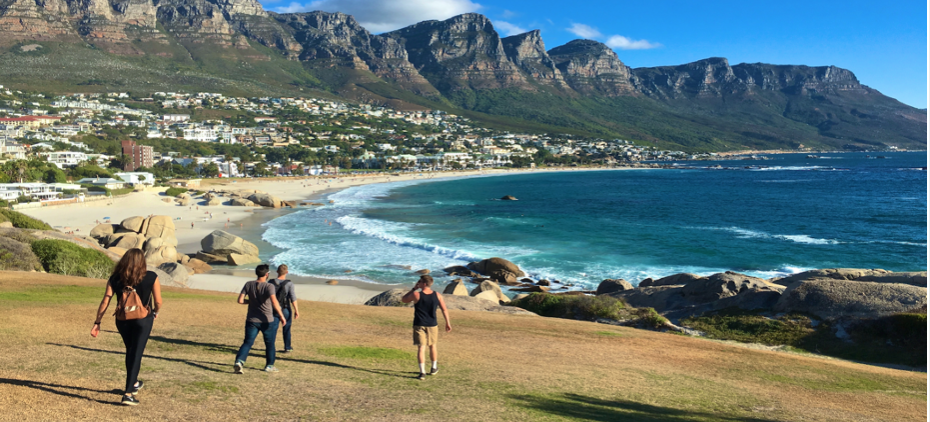Programs Spotlight: Georgetown Faculty-Led Programs in Africa

Posted in News Story
From undergraduate field research to a community-based internship, what experiential opportunities await you this summer?
February 4, 2020 –
Summer Study Abroad in Africa
Have you considered studying abroad in Africa? Despite being a continent with 54 countries and home to about 1 billion people, only around 30 Georgetown students per year choose to study abroad in an African country. To allow students to study diverse linguistic patterns, economic development, and anthropological trends, Georgetown offers three of its own exciting short-term summer programs in Africa: The Africa Field School (Basanga, Zambia), Social Transformation in South Africa (Cape Town, South Africa), Development Challenges in Tanzania (Dar Es Salaam, Tanzania). Each program focuses on a particular global theme — history of migration, local and national politics of development, community-based social justice movements — and is led by esteemed Georgetown faculty along with experts from the local region. Each program is heavily field-based, offering some form of experiential learning, to reinforce your academic understanding. At the end of each program, you will have participated in a once in a lifetime opportunity and learn first hand about issues and topics affecting society from highly regarded Georgetown faculty.
Why do Experiential Learning?
Experiential learning refers to a process of learning that combines study, reflection, and direct experience outside of an academic setting. Mentored research, community-engaged service projects, and internships are examples of experiences that form the basis for experiential learning.
On each of the three short term Africa programs, you will get involved in your community, interact with others, conduct research, analyze trends and data, and learn in different physical and academic environments. Experiential learning seeks to go beyond academics and coursework in the typical classroom and utilizes other means to present topics and issues. Georgetown offers experiential learning by way of an internship with local organizations in Tanzania, community-based learning (CBL) in which you volunteer at a non-profit organization and directly interact with local people in South Africa, as well as fieldwork in Zambia. Read more about your study abroad options in Africa and be at the forefront of a once in a lifetime academic opportunity.
The Programs:
Georgetown in Zambia: The Africa Field School
Led by Professor Kathryn de Luna from the History Department, the Georgetown in Zambia summer program is designed to engage students in a broad, multidisciplinary research project that seeks to understand the environmental factors of migration in central Africa. Alongside anthropologists, oral historians, geologists, and climate scientists, you will learn to employ the research methods of the social and natural sciences to draw a comprehensive picture of past migratory patterns and language development. The program will culminate in a chance to present original research findings to professionals in Zambia and the U.S.
The program will start July 5, 2020, and end August 1, 2020, applications close February 13, 2020.
Coursework: You will earn six credits for this research internship which directly transfers to your academic study. These courses focus on field research methods in archaeology, oral history, linguistics, and soil science of the area.
Georgetown in Dar es Salaam: Development Challenges in Tanzania (Internship)
Moving from reconstructing the past to tackling the challenges of the present, the Development Challenges in Tanzania program studies economic development at the local and national level in Tanzania, particularly the interplay between governments and non-profit organizations. The program centers on a part-time internship for a community-based organization, as well as a regular reflection seminar and Swahili language study at the University of Dar Es Salaam’s Institute of Kiswahili Studies. The program, a long-standing offering of the African Studies program (School of Foreign Service), is perfect for students considering a career in international development and non-profit work.
The program will start May 23, 2020, and will end June 28, 2020, applications close February 13, 2020.
Coursework: On the program, you will receive 6 credits of academic credit through your internship and seminar as well as direct GU credit for a Swahili language class.
Georgetown in Cape Town: Social Transformation in South Africa
A joint venture of the Justice and Peace Studies, Women and Gender Studies, and Conflict Resolution programs, this program examines the intersection of human rights-based and social justice initiatives in the context of South Africa’s multi-layered and complex history. Coming out of decades of apartheid, many aspects of South African society continually confront challenges related to social advancement, inequality, and justice. Bearing the Community-Based Learning (CBL) designation, the program will engage you directly with local organizations focused on advocacy, research, and service on behalf of marginalized community members in and around Cape Town.
The program will start May 18th, 2020, and will end June 3, 2020 applications close February 13, 2020.
Coursework: You will earn three credits for this program, which also counts toward the Justice and Peace Studies Department’s requirement for Community Based Learning (30 hours). You can also complete coursework in African studies and complete your HALC requirement.
